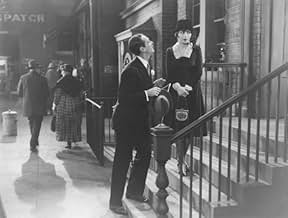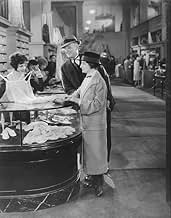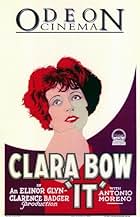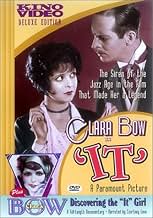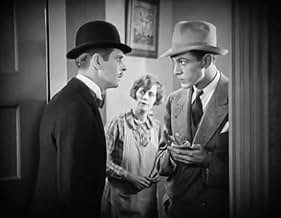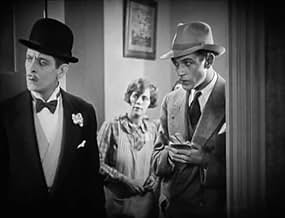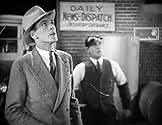IMDb रेटिंग
7.2/10
3.8 हज़ार
आपकी रेटिंग
अपनी भाषा में प्लॉट जोड़ेंA salesgirl pursues a handsome playboy.A salesgirl pursues a handsome playboy.A salesgirl pursues a handsome playboy.
- पुरस्कार
- कुल 1 जीत
Elinor Glyn
- Madame Elinor Glyn
- (as Madame Elinor Glyn)
Elmo Billings
- Office Boy
- (बिना क्रेडिट के)
Gary Cooper
- Newspaper Reporter
- (बिना क्रेडिट के)
Lloyd Corrigan
- Yacht Cabin Boy
- (बिना क्रेडिट के)
Cheryl Holt
- Baby
- (बिना क्रेडिट के)
Eleanor Lawson
- First Welfare Worker
- (बिना क्रेडिट के)
Rose Tapley
- Second Welfare Worker
- (बिना क्रेडिट के)
Dorothy Tree
- Waltham Employee
- (बिना क्रेडिट के)
फ़ीचर्ड समीक्षाएं
Clara Bow's energy and glamour give this otherwise lightweight feature some life, making it quite a bit better than it had any right to be. The rest of the production does have a couple of strengths, but not enough to carry the load. The story is pleasant and generally entertaining, but rather negligible. The "It" theme is overworked, and downplaying it in favor of a little more substance might have improved the movie. Yet it is still certainly worth seeing.
Bow gets a character that allows her to use her strengths while also giving her a chance to do some other things as well, as her character goes through a series of romantic episodes and other experiences. Perhaps one reason why this is one of her best-remembered features is that the role gives her some opportunities to show different sides of her character, as she uses her facial expressions and other resources pretty well.
The rest of the cast is just there for Bow to play off of, and the characters are mostly one-dimensional. Antonio Moreno is solid but sometimes lifeless, and his friend Monty is an annoying character whose only constructive purpose is to advance the plot at a couple of key stages.
One minor asset of the movie is the inter-titles, several of which add a bit of bite to some otherwise trite situations. But the constant references to the "It" concept, which apparently come from the Elinor Glyn source material, get old quickly. It's hardly a very imaginative or significant concept, and a couple of passing references would have been more than enough, so as to allow the story to stand more on its own.
The story itself is told rather well, and there are some enjoyable sequences, especially towards the end. While the whole thing is too superficial to belong on any best-of or must-see lists - especially in a year that produced so many outstanding and significant films - it's a generally entertaining little feature, and it is one of the best showcases for Clara Bow, who was one of the most popular performers of the 1920s.
Bow gets a character that allows her to use her strengths while also giving her a chance to do some other things as well, as her character goes through a series of romantic episodes and other experiences. Perhaps one reason why this is one of her best-remembered features is that the role gives her some opportunities to show different sides of her character, as she uses her facial expressions and other resources pretty well.
The rest of the cast is just there for Bow to play off of, and the characters are mostly one-dimensional. Antonio Moreno is solid but sometimes lifeless, and his friend Monty is an annoying character whose only constructive purpose is to advance the plot at a couple of key stages.
One minor asset of the movie is the inter-titles, several of which add a bit of bite to some otherwise trite situations. But the constant references to the "It" concept, which apparently come from the Elinor Glyn source material, get old quickly. It's hardly a very imaginative or significant concept, and a couple of passing references would have been more than enough, so as to allow the story to stand more on its own.
The story itself is told rather well, and there are some enjoyable sequences, especially towards the end. While the whole thing is too superficial to belong on any best-of or must-see lists - especially in a year that produced so many outstanding and significant films - it's a generally entertaining little feature, and it is one of the best showcases for Clara Bow, who was one of the most popular performers of the 1920s.
this is a very fast paced and cute comedy starring the beautiful clara bow. the plot is fairly routine for it's era, but clara gives this film a real boost. she's especially appealing in a scene where she is making funny faces at her friends baby. the scenes at coney island are also fun to watch. and check out the subtitles with the 1920's slang. pretty funny stuff.
I decided I'd watch a little bit of this film on the computer. Knowing me I usually get distracted and stop watching but this film was so very different. My first silent film, and already a favourite. I could literally not stop watching Clara Bow, she was absolutely fascinating. I'd read David Stenn's wonderful biography on her so it was great to see her finally acting. When she's on screen you block out everything else and her acting ability wonderful - she can cry at the drop of a hat! So, instead of getting distracted I watched this movie the whole way through and enjoyed every moment of it... but my favourite parts were definitely with Clara. In fact, you could say I wasn't really interested in anyone else! This movie is HER movie. It's fun, flirty and just a great movie. I recommend it for anyone who loves silent movies, Clara Bow, or flirtatious movies pushing the limit. Age wise, I think I can recommend it for about 15 onwards - I'm 14 and I really enjoyed it - but not all teenagers will appreciate the film. Which is a pity, because it's wonderful!
If there's any question why Clara Bow became one of the top box office stars of the late silent era, "It" answers that question. The film, perhaps the one with which she will always be associated, is indeed a star turn, but a great one.
Bow,playing a counter girl who wins the heart of the owner of the great department store she works, turns in a memorable performance.
She brings everything you could want to the role, from great comic timing to a very robust physical presence. More than anything, of course, she is incredibly photogenic, a magnetic presence that simply lights up the screen.
Most heartening to me was the very large number of people well under 30 who viewed this film with me the night I saw it. They seemed to absolutely loved it.
Bow,playing a counter girl who wins the heart of the owner of the great department store she works, turns in a memorable performance.
She brings everything you could want to the role, from great comic timing to a very robust physical presence. More than anything, of course, she is incredibly photogenic, a magnetic presence that simply lights up the screen.
Most heartening to me was the very large number of people well under 30 who viewed this film with me the night I saw it. They seemed to absolutely loved it.
Two years after "It" came out the silent picture would be a thing of the past. Still, the most striking thing about this movie, after the always beautiful Clara Bow, is how modern it looks. On the Kino DVD the picture is sharp and clear, with excellent contrast. It looks as good as black and white can.
The story itself is fluff. The It of the title, which translates roughly as sex appeal, is irrelevant to the plot. Salesgirl Betty Lou Spence (Bow) falls in love with owner of big department store Cyrus Waltham, Jr. (Antonio Moreno). She chases him, he chases her, misunderstanding separates them. Even though the plot is light, it fulfills its modest goals well, largely due to Bow's energy. William Austin, as Moreno's friend Monty, is also a high point. In one key scene he also shows himself to be a far more caring and sensitive person than Cyrus, and probably a better choice for Betty's affections. Sadly, that's not how this kind of movie works.
The camera work is pretty sophisticated for the time. The scenes of Betty and Cyrus's date at the beach, with quick cuts as the two laugh, play and fall in love, are now a cliche, although one that's still used. The use of panning, different angles during scenes and plenty of close-ups keep the movie moving, without the long shots before a stationary camera that characterized many indoor scenes during the silent era. Were it not for the lack of sound and the title cards, one could easily think this movie was made as late as the start of WWII.
"It" is not an important movie in the development of cinema, either in terms of technique or theme. Instead, it's an entertaining romantic comedy, largely due to Bow's electrifying screen presence and Austin's satisfying performance. Clara Bow was a huge star, who defined the female sex symbol during the 20s. Even today it's hard to imagine anyone watching her and being able to deny that she does indeed have It.
The story itself is fluff. The It of the title, which translates roughly as sex appeal, is irrelevant to the plot. Salesgirl Betty Lou Spence (Bow) falls in love with owner of big department store Cyrus Waltham, Jr. (Antonio Moreno). She chases him, he chases her, misunderstanding separates them. Even though the plot is light, it fulfills its modest goals well, largely due to Bow's energy. William Austin, as Moreno's friend Monty, is also a high point. In one key scene he also shows himself to be a far more caring and sensitive person than Cyrus, and probably a better choice for Betty's affections. Sadly, that's not how this kind of movie works.
The camera work is pretty sophisticated for the time. The scenes of Betty and Cyrus's date at the beach, with quick cuts as the two laugh, play and fall in love, are now a cliche, although one that's still used. The use of panning, different angles during scenes and plenty of close-ups keep the movie moving, without the long shots before a stationary camera that characterized many indoor scenes during the silent era. Were it not for the lack of sound and the title cards, one could easily think this movie was made as late as the start of WWII.
"It" is not an important movie in the development of cinema, either in terms of technique or theme. Instead, it's an entertaining romantic comedy, largely due to Bow's electrifying screen presence and Austin's satisfying performance. Clara Bow was a huge star, who defined the female sex symbol during the 20s. Even today it's hard to imagine anyone watching her and being able to deny that she does indeed have It.
क्या आपको पता है
- ट्रिवियाElinor Glyn gave many confusing and sometimes contradictory explanations for what "It" meant, but she always said that "It" did not mean "sex appeal" necessarily and that anyone who said it did was vulgarizing her concept. Nonetheless, "It" became a euphemism for "sex appeal," which caused that pronoun to be entered into the American lexicon as a noun in the late 1920s.
- गूफ़As Waltham climbs onto the anchor, his shirt sleeve is intact. The scene cuts away to Monty and Adela in the rowboat for a brief moment; however, in the next scene, Waltham's sleeve is completely torn.
- भाव
Monty Montgomery: I feel so low, old chap, that I could get on stilts and walk under a dachshund.
- कनेक्शनFeatured in The House That Shadows Built (1931)
टॉप पसंद
रेटिंग देने के लिए साइन-इन करें और वैयक्तिकृत सुझावों के लिए वॉचलिस्ट करें
- How long is It?Alexa द्वारा संचालित
विवरण
बॉक्स ऑफ़िस
- US और कनाडा में सकल
- $4,11,891
- चलने की अवधि1 घंटा 12 मिनट
- रंग
- ध्वनि मिश्रण
- पक्ष अनुपात
- 1.33 : 1
इस पेज में योगदान दें
किसी बदलाव का सुझाव दें या अनुपलब्ध कॉन्टेंट जोड़ें


